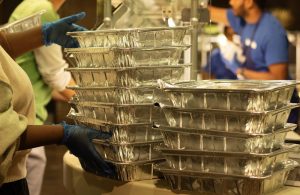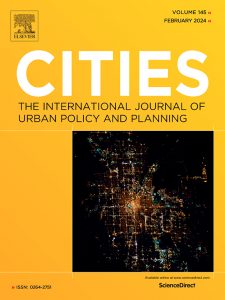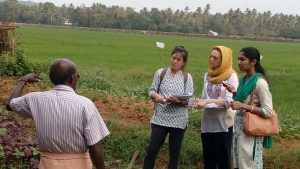About the position
The University at Buffalo Food Systems Planning and Healthy Communities Lab (UB Food Lab) is thrilled to announce a two-year full-time postdoctoral position to join a project at the intersection of data sovereignty and food sovereignty. Funded by the Robert Wood Johnson Foundation and supported by the School of Architecture and Planning, the project aims to close the gap between how communities seek to represent their food-related experiences and challenges, and how these are typically measured, reported, and visualized in food system data dashboards. We are especially focused on reducing intersecting data and food inequities experienced by Black, brown, and New American communities through the design of equitable data infrastructure. The team will prepare guidelines for developing data dashboards that are high quality and simultaneously both responsible and accountable to those most impacted by structural inequities in the food system. Read about the specific project with which this post-doc is associated here.
The ideal candidate will possess a critical theoretical framework, robust methodological training, and deep experience in working on co-produced participatory action research projects. The selected candidate will work with a transdisciplinary research team including faculty, community advisors, and trainees. Candidates will produce academic and public facing scholarships including journal articles, toolkits, etc. Candidates with a broad range of methodological experience and interest are welcome; we value a broad range of epistemological approaches; qualitative, quantitative, and spatial analyses are welcome to apply. Candidates with experience with design of public facing data dashboards are encouraged to apply.
What we offer
We offer a supportive mentoring and collegial work environment. The post-doc position is located within the UB Food Lab and supported by a collegial faculty team including Drs. Samina Raja (primary mentor), Alex (Alexandra) Judelsohn, Alissa Ujie Diamond, and Mohamad Aly Etman.
The UB Food Lab is a community-rooted and globally recognized transdisciplinary research group dedicated to research that critically examines the role of local government policy and planning in facilitating equitable, healthy, and sustainable communities. Our team focuses on the food system as a space and lever for change. We work on research that aims to make a difference in people’s lives by promoting food and health equity. We promote food and health equity by conducting and implementing research in partnership with community advocates and governments locally (in Buffalo and across the US) and in the Global South (with particular interest in Kashmir). We are especially committed to working with communities of color, immigrants and refugees, youth, and other marginalized groups. We offer technical assistance to local governments through the Growing Food Connections initiative housed in our lab. Read more about our work and our team here: http://foodsystemsplanning.ap.buffalo.edu/.
Required Qualifications
Doctoral degree
Preferred Qualifications
- Transdisciplinary training that intersects with data science, ethics, food systems, geospatial science, Indigenous studies, philosophy, public health, sociology, science and technology studies, urban and regional planning, or related fields
- Outstanding record of scholarship at the intersection of data sovereignty and food sovereignty
- Training and experience in working with publicly accessible data sets
- Experience in or interest in co-produced approaches to designing and executing research in partnership with communities
- Exceptional communication skills, especially in communicating complex concepts with clarity to a public audience
How to apply?
Submit your materials via UB jobs portal here: https://www.ubjobs.buffalo.edu/postings/55105
The following materials are required:
- A cover letter (letter should describe how the advertised position aligns with candidate’s academic training, prior record of scholarship, and future ambitions)
- Curriculum vitae [include names and full contact information of three academic references]
Note: This portal for the position accepts applications for multiple post-doc positions on UB Campus. Please ensure that your materials clearly indicate that you are applying for a post-doc in the UB Food Lab. Label your files as “UB Food Lab_Cover Letter_Your Last Name” and “UB Food Lab_CV_Your Last Name”.
Timeline and process
Application due date: Immediately (until filled); interviews will begin Feb 15, 2025
Position start date: September 01, 2025
Shortlisted candidates will be interviewed virtually by a search committee (Members include Samina Raja, Alex Judelsohn, Alissa Ujie Diamond, and Mohamad Aly Etman)
Questions?
For substantive questions about the position, please email UB Food Lab staff at: foodsystems@ap.buffalo.edu [Place “Data Equity for Food Equity Post-Doc” in subject line]. For questions about the job portal or other HR related questions please email School of Planning and Architecture staff Barb Carlson at carlsonb@buffalo.edu.
The post-doc appointment is through the Research Foundation for SUNY. Research Foundation for SUNY is an Equal Opportunity Employer, and welcomes all to apply including females, minorities, individuals with a disability, and protected veterans. The RF does not discriminate against employees or applicants based on sexual orientation, gender identity, or any other characteristics protected by applicable law.
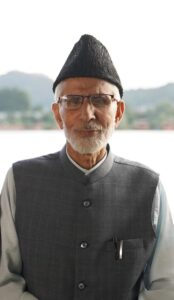
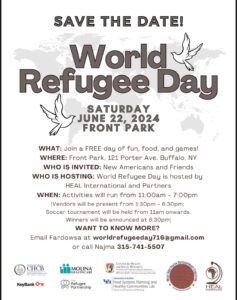 Worldwide about 114 million people are forcibly displaced from their homes due to persecution, human rights violations, and acute and protracted violence (UNHCR, 2023). Our city and region is fortunate to be a refuge for resettled New Americans. In 2023, 1312 individuals were resettled in Erie County. Resettled individuals in Buffalo come from a variety of different places including Afghanistan, Columbia, Guatemala, Myanmar, Somalia, Syria, The Democratic Republic of Congo, and Ukraine, among others.
Worldwide about 114 million people are forcibly displaced from their homes due to persecution, human rights violations, and acute and protracted violence (UNHCR, 2023). Our city and region is fortunate to be a refuge for resettled New Americans. In 2023, 1312 individuals were resettled in Erie County. Resettled individuals in Buffalo come from a variety of different places including Afghanistan, Columbia, Guatemala, Myanmar, Somalia, Syria, The Democratic Republic of Congo, and Ukraine, among others.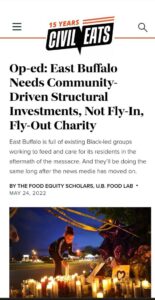 Revisiting the Civil Eats Op-ed: Addressing food apartheid requires sustained structural investments, not charity
Revisiting the Civil Eats Op-ed: Addressing food apartheid requires sustained structural investments, not charity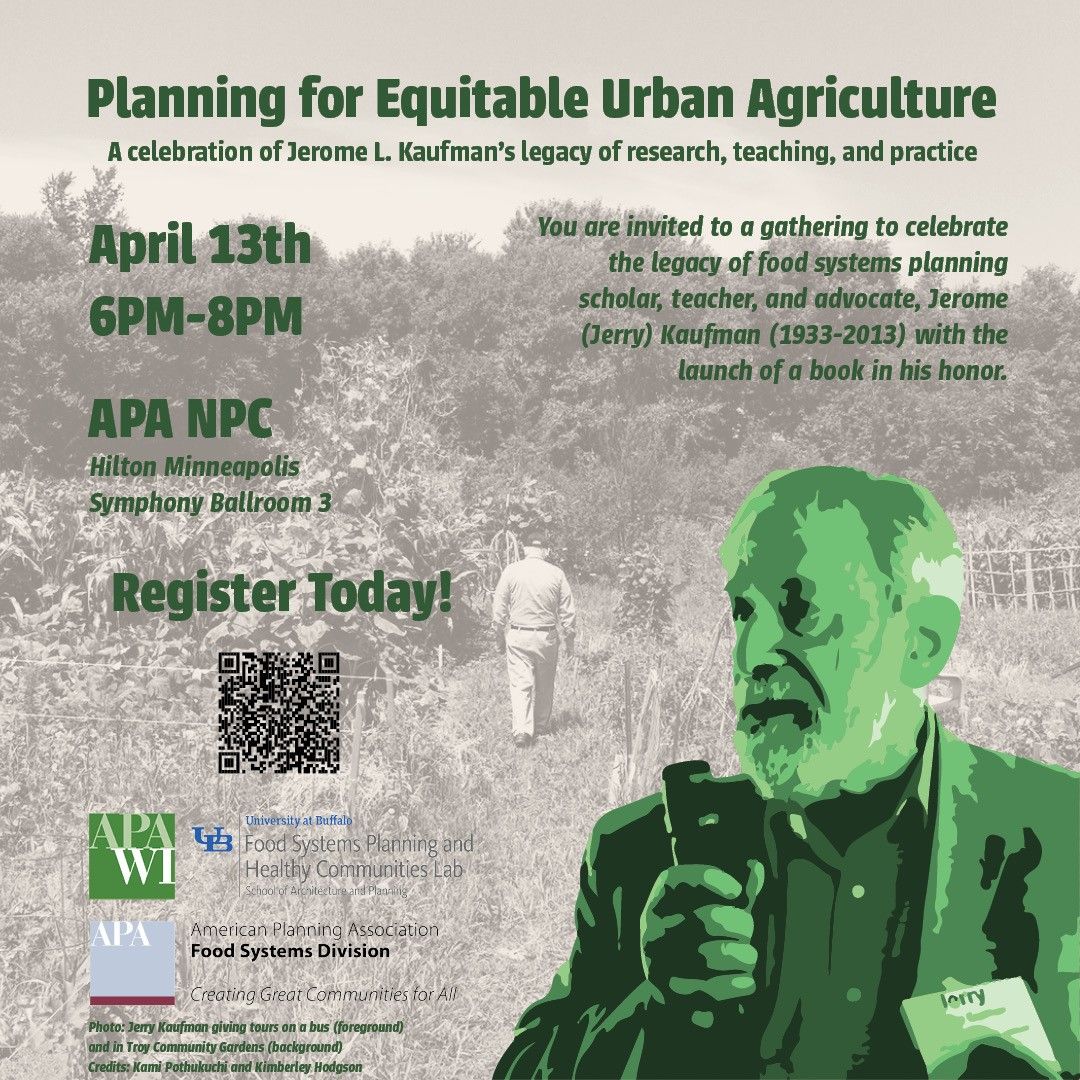
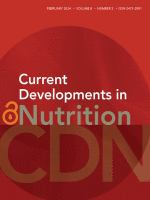 In this article in ELSEVIER, the authors describe how the use of social infrastructures impacts food security and nutrition equity in a majority Black and urban community in the United States.
In this article in ELSEVIER, the authors describe how the use of social infrastructures impacts food security and nutrition equity in a majority Black and urban community in the United States.